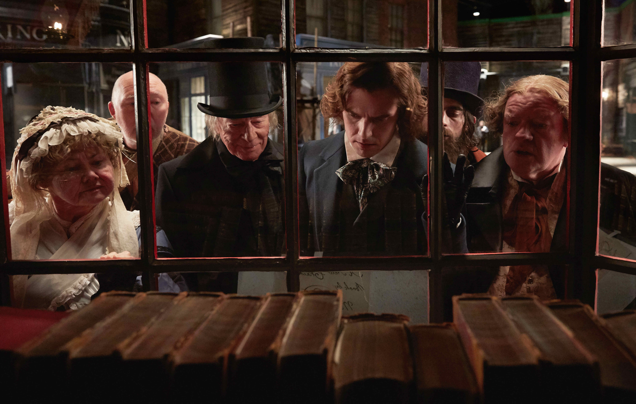In the nearly two centuries since it’s initial publication in 1843, Charles Dickens’ A Christmas Carol has spawned countless adaptions in nearly every medium from film, television and stage productions to immensely popular public readings by the author himself (a tradition now carried on by actors impersonating Dickens). It’s not hard to see why the tale has remained a holiday staple as it handily captures the true spirit of love, generosity, and kinship with our fellow men not just at Christmas, but through all the days of the year.
While we always welcome Carol into our hearts and arts every December, there are only so many ways you can tell the same basic story of a mean old rotten miser seeing the error of his ways via an overnight spiritual journey before it starts to become stale. This makes it nothing less than a Christmas miracle that The Man Who Invented Christmas manages to put a fresh spin on the material by depicting how it came to be written in the first place.
Based on the 2008 book of the same name by Lee Standiford, the film begins in 1842 with Charles Dickens (Dan Stevens) riding high on his newfound fame with a tour of America before promptly dropping us nineteen months (and three flops later) with the author struggling to come up with any fresh ideas. With the expenses of his new lavish lifestyle and charitable nature mounting, the author is suddenly inspired by several chance encounters to write a “Christmas Ghost Story”.
When his publishers balk at the idea of promoting and printing such a book in a matter of only weeks, Charles decides to go all in and publish the book himself. His muse soon arrives in the form of the book’s central character Ebeneezer Scrooge (Christopher Plummer) whose phantom both inspires and goads the writer as he struggles to bring his book to completion. This is made all the more difficult by constant interruptions from his friends and family including estranged father John Dickens (Johnathan Pryce). When the novel’s final chapter leaves Charles with an agonizing case of writer’s block, he must confront his own demons and the choices he’s made before he can bring the greatest holiday of all time to a conclusion.
Continuing in the tradition of Canadian/Irish co-productions like Brooklyn and Room before it, the film lovingly threads the structure of Dickens’ novel with the story of its writing by having the author examine his past, present, and future through the three Christmas spirits he creates in tandem with Scrooge. Filmed in Ireland, the film greatly benefits from a largely Shakespearian-trained cast with standout turns by Pryce as Charles’ merry, but tortured father, Morfydd Clark as neglected-wife Kate, and Justin Edwards as Dickens’ exasperated-yet-supportive friend John Forster.
Previously buried beneath unnecessary motion capture in Beauty and the Beast, Dan Stevens is given a proper chance to shine as the creative powerhouse that was Charles Dickens. A passionate and charming soul on the outside, the character buries ample pain from a childhood in poverty where his father’s debts left him to the mercy of the workhouse and Stevens portrays this beautifully. He is aided by an appropriately crusty Christopher Plummer, the film’s solely-Canadian cast member. The oldest thespian to ever portray Scrooge at 87, Plummer exudes the expected nastiness and warmth the role demands as he gleefully toys with his creator for control over the story. It’s honestly a surprise the actor has never played the role on stage or screen before.
Bharat Nalluri has come a long way from his days directing direct-to-video fare like The Crow: Salvation and handles the material with confidence balancing out the drama with just enough whimsy to keep the whole affair in the spirit of the season. While it’s balance of tone is sufficient, this reviewer feels as though the second act could have been fleshed out some more as Dickens seems to blaze through the writing only to spend a bloated third act attempting to decide the book’s ending. The audience already knows that Scrooge will choose redemption so the amount of agonizing feels a little overdone. But at a solid 104 minute runtime, the film is in no danger of overstaying it’s welcome.
Many holiday films of late seem content to celebrate candy-coloured lunacy and debauchery (Office Christmas Party or Bad Moms Christmas anyone?), so it’s a true gift when a film that unpretentiously reminds us of the spirit of the season and even where some it came from comes along. Share it with your loved ones this holiday and the rest to come.
8.5/10





